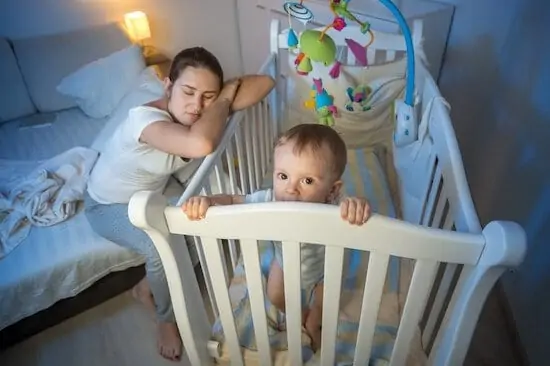Once you get the hang of this mom-thing, you feel pretty good, right? I remember when I finally figured out how to get each of my daughters to go to sleep. Both have different personalities, and that came into play big time when putting them down for the night like babies.
But my eldest as a toddler was easy. We’d get ready for bed, read a story, I’d kiss her goodnight, and that was that. There were a few occasions she’d get up because she was thirsty, had to go potty, or had a bad dream and wanted snuggles, but most of the time, she would go right to sleep and stay that way.
Not the clinger though. 🙁
The clinger was nearly impossible to get out of our room. We fixed up her room more and let her pick things out for it. But when bedtime came, she wailed and wailed. I’d rock her to sleep (I have a great post about that by the way) and then put her into the bed.
Now I lay next to her and tell her stories and sing songs until she goes to sleep. She’s a preschooler now, but she’s always been a clingy thing, so this is her version of letting go a bit. Once she’s out, I sneak away and live my best mom-life.
Getting a toddler to sleep can be very tricky because, as you can see from my daughters, there is no one way to get them to sleep. Personality really plays into it. However, it’s not hopeless. I’m going to tell you some tricks that could help you out and keep the sanity in your home, so keep reading!
What Do You Do When Your Toddler Won’t Sleep?
If you’re reading this bleary-eyed and dreaming of days with better sleep ahead, I totally get you. I’ve been there, and this is a huge hurdle. But it can be jumped over. Realign your patience and train your brain to think like a toddler.

Dr. Sears states that toddlers won’t go to bed for three reasons. There’s the fear of going to sleep, not wanting to be away from you and your spouse, and wanting to spend more time with you.
Now that you know this, you can use that in your favor to tackle toddler bedtime drama.
If both you and your spouse work outside the home, expect the pain-in-the-butt behavior to be about wanting to be with you. Remember, kids at this age can’t articulate themselves.
Plus, they’re more likely to procrastinate around bedtime when there’s been a big change. Think a new baby, new house, new routine, etc.
As you’re probably aware, you can’t make a child go to sleep. Just like there are some nights I can’t even make myself go to sleep (much as I’d love to!). But you can do things that will make it easier for your toddler to go to sleep.
Stick to a bedtime routine
From the time both my daughters were babies, I created a bedtime routine. Newborns can’t follow a routine, but it’s building that familiarity that works for them. They come to expect it, and the things you do in this routine help them feel sleepy over time.
The same is true with toddlers. You can’t just let things fly every night. Yes, when the company is over, I tend to let my girls stay up late. But that should be the exception to the rule.
Every night, work on cementing a relaxing bedtime routine. Make it fun and use it to spend time with your toddler. This is so important if you’re working all day or your child is in preschool all day. You’re like the moon to them. You’re everything, so take it as a compliment and spend that time together. You’ll soon see better results. It’s scientifically proven!
Fix up their room
Likely, you spent a great deal of time making a baby nursery for your child. But now your child is a toddler. Toddlers like having some control over things. Think about it from their point of view. Someone is always telling them to do this and that. They have personalities and thoughts too.
While you can’t let them decide to stay up until midnight and watch scary movies, you can let them pick things for their room to make it more their style. They have cool lights you can get that won’t let them feel alone in the dark. You can let them choose their sheets for their bed, a new set of pajamas, and so on. Giving them choices, so they feel in control and have a room that feels like they had a say in will make it much easier to get your toddler to sleep in there without a fuss.
Time it
At about 20 minutes before bedtime, I tell my daughters as much. I’ve been doing this one for years. I then alert them after 10 minutes that they have 10 minutes remaining. This stops any chance for dispute. They’ve been told, not once but twice, that their bedtime is coming. So when I pop around the corner and tell them it’s time to get ready, I’m met with zero to no resistance.
One of my friends used this method but with an egg timer, and I thought that was great.
She let her son push the button on it and then turned him loose to play. After it beeped, he’d come and push the button on it again to shut it off and then went off to get ready for bed.
Start the routine early
When you take your time with the routine and build up to bedtime, this feels like lots of time with you. Toddlers can’t tell time, so lengthening the process, so it feels longer fulfills that need Dr. Sears clued us into.
For some of you, all of this will be enough to get your toddler to go to sleep. For others of you, you’re going to need to do a little bit more to help.
Cuddle up

One of the things that worked with my clinger was to get in bed with her. I’d make it fun and read a story. Then I’d put the book down and make up stories. The first few would be silly, but the last ones would be more soothing, and I’d lower my tone and think of relaxing plotlines. I’d also hum my favorite songs and pat her gently on the back. This worked like a charm.
Make sure your toddler is exhausted
Kids have tons of energy to burn. I often joke that the reason I’m so tired is that my kids siphon away any energy I have. My eldest, even now at the age of 8, is always bouncing around. Watching her is exhausting.
Still, despite all this running around, they may do during the day, even in daycare or school, it might not be enough. Take some time early in the evening, well before bedtime, to run your kids around with a family walk, a game in the yard, or anything else that keeps you all active. When the weather is good, we often go swimming, especially on weekends.
Exercise benefits everyone in the family, and it’s a healthy habit you want to teach your kids anyway. In fact, even for adults, they say getting exercise early on in the day will help you sleep better. It definitely works on kids.
How Do You Get an Overtired Toddler to Sleep?
Now I’d like to address the overtired toddler syndrome. Toddlers don’t show signs of being tired like you, and I do. Where we get slow and start fading out, toddlers tend to become more bouncy and active.
This is why naps are crucial in those toddler years. When they skip a nap, you can bet you’ll be dealing with hyperactivity later on and have a hard time getting them to sleep.
Ideally,
You should watch your toddler about 4 to 5 hours after they get up in the morning to see if they rub their eyes or yawn. When you notice this, it’s time for a nap. Your toddler is at a prime state to go down for this nap because the melatonin (the natural sleep hormone our brains produce, which I’ll discuss more below) is taking over the cortisol which is the stress hormone.
You should always plan your day around your toddler’s nap. If you have to run errands, do them before or after this nap. If your child is in daycare or with a nanny while you work, make sure the caregiver puts your toddler down for that nap. Otherwise, this will leave you with loads of stress in the evening, trying to calm your overtired toddler.
Toddlers tend to exhibit overtiredness in a variety of ways. Some are clingy (like my youngest), while others are clumsy. Some refuse to eat and are cranky. Others run around like they’ve drunk your coffee. You’ll see temper tantrums and meltdowns here too.
If you want to get an overtired toddler to sleep, you must 1) make sure they take that nap! And 2) make sure they burn off energy during the day.
If you’re the one at home with your toddler, your plan of action is now to ensure naptime happens. Then after that nap, run them around and play. Chase each other in the yard, go for a walk, play catch, go swimming (if they can swim), and be active. This will take care of the overtired toddler problem.
Can You Give Melatonin to a Toddler?
As I mentioned just above, melatonin is the hormone your brain creates, which is often nicknamed as the sleep hormone. It sets your internal clock. At night, melatonin levels rise and tell your body, “Hey, it’s time to go to bed.” Your internal clock also regulates that production, slowing it down before it’s time for you to get up.
Melatonin has a lot of effects on the health, but if you have sleep troubles, you can take it as a supplement to help you sleep. As it is a natural hormone your body makes, it is very safe. You can buy it just about anywhere though you should look into quality brands. You should absolutely ask your doctor for a reference.
When it comes to children, though, you might wonder if it is safe to give melatonin to your toddler. Most studies have shown it is safe in the short-term for children, though some may have side effects.
Very few studies have been conducted about having children use it for the long-term, so you definitely want to have a conversation with your toddler’s pediatrician before you try it. The FDA does not approve melatonin supplements for children though, citing that further studies must be done to ensure it is, in fact, safe for them to use. The short-term results seem fine, though, but again, a medical professional can give you the best advice here.
It’s so important that if you continue to have trouble getting your toddler to sleep, even after trying these techniques that you have him or her evaluated by the pediatrician to rule out any medical condition.
Final Thoughts on Toddler Sleep
Toddlers can be tricky, but knowing how they tick will be your recipe for success. Always try to be patient as losing it can just make the problem worse. If you do lose your temper and scream, apologize to your child and move forward, taking it through the tips above to achieve success in toddler sleep, and success in your sleep too.
Leslie Berry lives with her husband and two young daughters in Los Altos, California, where she loves helping other moms get comfortable with motherhood and embracing the insanity with facts peppered with laughs.
She loves eating too much sushi, exercising, and jamming out on her Fender. Read more about Leslie here.






